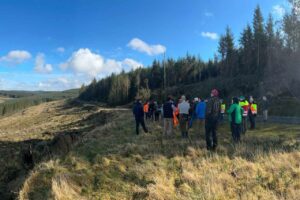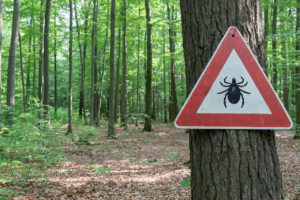An article published in the Institute’s Scientific journal, Forestry, has hit the headlines this week after the results from a recent horizon scanning exercise were published warning of the multiple emerging threats to woodlands, including tree disease and extreme weather, in the next 50 years.
Funded by Forestry England, the study was led by Chartered Forester Dr Eleanor Tew MICFor, visiting researcher at the University of Cambridge’s Department of Zoology and Head of Forest Planning at Forestry England. Dr Tew was awarded the Institute’s Hugh Miller Award for Excellence for her Professional Membership Entry application in 2022 and was one of the Institute’s Emerging Leaders, funded by the Trees Call to Action Fund. The article was co-authored by over 40 experts from across the sector, including the Institute’s Executive Director, Louise Simpson, and several Chartered members.

Dr Tew said:
“The next 50 years will bring huge changes to UK forests: the threats they face, the way that we manage them, and the benefits they deliver to society.
We hope the results from this horizon scanning exercise serve as an urgent call to action to build on, and dramatically upscale, action to increase forest resilience.”
These results are both concerning and exciting. However, we should be optimistic, remembering that these are possibilities and not certainties. Crucially, we have time to act ‒ by responding to the threats and embracing the opportunities, future generations can have resilient forests with all the benefits they offer.”
The forest horizon scanning panel long listed 180 key issues, agreeing on a final list of 15 priority issues:
-
Catastrophic forest ecosystem collapse
-
Increased drought and flooding change the social costs and benefits of trees
-
Forest management becomes more challenging due to changing seasonal working windows
-
Protecting and enhancing soil microbial ecology becomes a higher priority
-
Viruses and viroids emerge as pathogens of increasing importance for trees
-
eDNA revolutionizes our understanding of forest ecosystems
-
Trees are at the heart of future urban planning
-
The Taskforce on Nature-related Financial Disclosures (TNFD) drives transparency and investment in nature-positive management
-
Natural capital funding streams are greatly upscaled
-
New technologies facilitate widespread adoption of smart silviculture
-
New technologies improve worker health and safety
-
New wood product markets stimulate more active forest management
-
UK commercial forest resources may not match future value chains
-
Unpredictable supply and demand dynamics in global wood product markets
-
International commitments will spotlight ecosystem integrity and drive monitoring efforts

The publication of ‘A horizon scan of issues affecting UK forest management within 50 years’ has been reported by the Guardian and the BBC. A press release from the University of Cambridge can be found here.
All Institute members have a free subscription to the journal Forestry and this article can be accessed here.
Read the article





